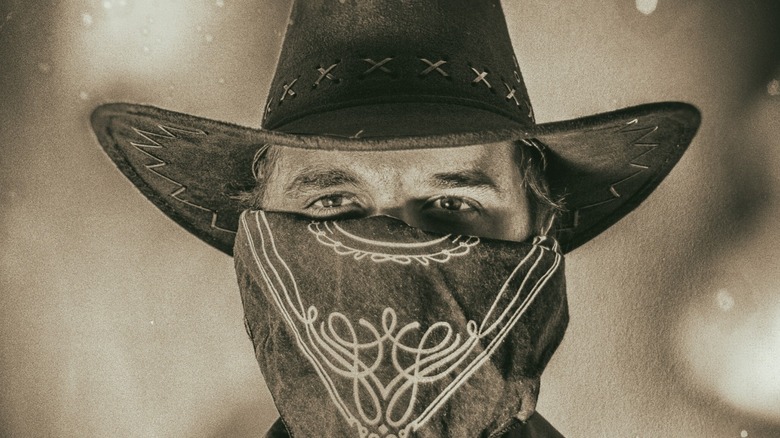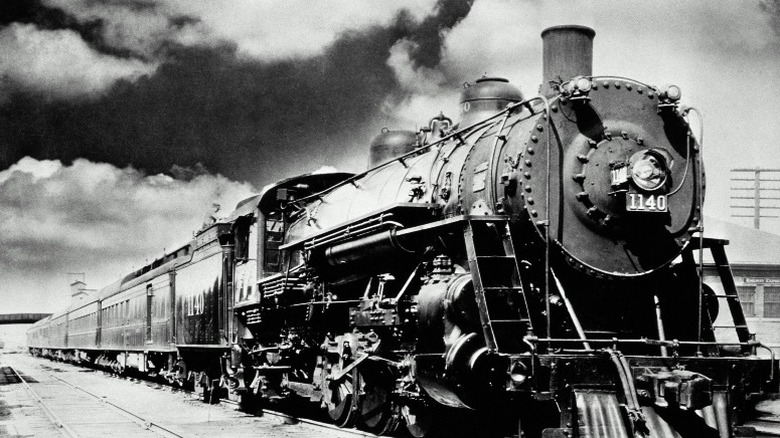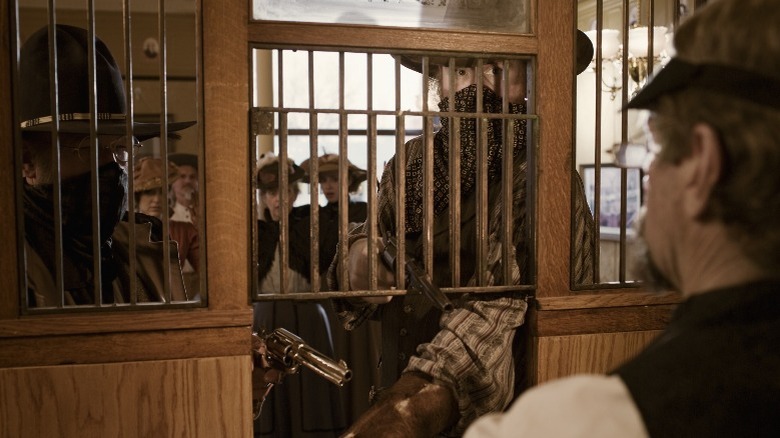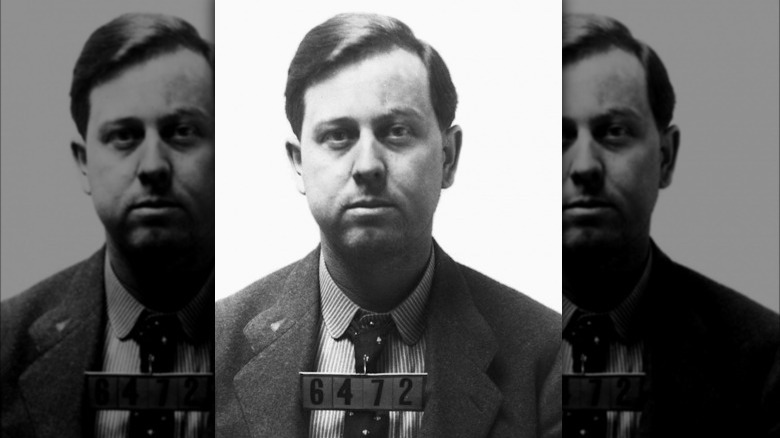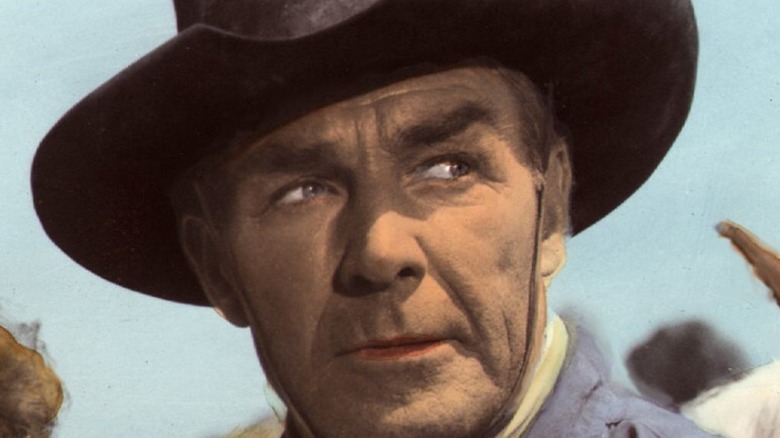How Bank Robber Emmett Dalton Went From An Outlaw To A Hollywood Actor
We may receive a commission on purchases made from links.
The life of Emmett Dalton took him from the sleepy farmland outside Kansas City, Missouri as a child to deep into Indian Territory, where he first began to run afoul of the law. Dalton was the youngest of the 11 children born into the Dalton clan and was barely a decade old when his family made the move to live near the Osage Nation (via Kansas Historical Society). Dalton's older brothers had varying professions in their new digs — the Dalton brothers were employed as deputies and guards but soon fell out of favor with authorities despite their positions (per Legends of America).
Frank Dalton was a deputy marshall for the federal court based out of Fort Smith, Arkansas. But his brothers Emmett and Bob, who worked in posses under him, would find themselves in trouble for selling whiskey to the Osage Nation. After their arrest, they both jumped bail and headed to New Mexico. Their stay here was short-lived, however.
With a newly formed gang of miscreants, they attended a poker game in the town of Silver City. The Dalton brothers lost badly, giving up a sizable sum of money. Enraged and believing the game to be fixed, Emmett and Bob drew their guns and seized back the money that they lost at the card table. They also helped themselves to the till. This would mark the first time the group known as the Dalton Gang would ever commit a robbery. And it would be far from the last.
The roots of the Dalton Gang
Emmett and Bob Dalton probably knew that sticking around Silver City would be a bad idea. The brothers headed west to California to meet up with their brother, Bill (via Legends of America). Bill Dalton had established himself as a farmer and seemed to be doing pretty well for himself. He was also involved in a political fight against the railroads with the newly founded Populist Party. Bill, Bob, and Emmett were soon joined by their brother Grat. Grat had recently served as a marshal but was dismissed when he was charged with horse theft. Though he was ultimately acquitted, he was not reinstated into his lawman position.
Bill's anger toward the railroad may have lit the fuse, creating the motive for the Dalton brothers and their cronies to begin plotting to rob trains. Their first attempt at this was foiled by a stubborn train guard. When the four Dalton brothers boarded the train, one of them shot and killed the fleeing engineer. They tried to coerce a guard into unlocking the door to the car that carried the train's cash. The guard flatly refused and opened fire on them. The Daltons fled the scene, with Bob and Emmett making their way back to Indian Territory. Grat and Bill were not so lucky — they were rounded up and brought to justice by a posse.
And so the life of the Dalton Gang began. The outlaws would be responsible for several bank and train robberies in Oklahoma and Kansas before most of them were killed during a daring double robbery.
The disastrous Coffeyville robberies
In October 1892, Dalton brothers Emmett, Bob, and Grat began a daring double robbery in the small town of Coffeyville, Kansas. They were joined by two other members of their gang, Bill Power and Dick Broadwell. Early that morning, Bob and Emmett went into the First National Bank while the other three in the gang waltzed into C.M. Condon & Co. Bank. In a stroke of bad luck, Bob and Emmett were recognized by a passerby on the way into the building. This person rose the alarm that the bank was about to be robbed, which prompted the people of Coffeyville to take to arms and defend their town (via Legends of America).
When gunshots began to fire inside the banks, the Dalton Gang emerged from both buildings. They were mostly empty-handed. In a series of fierce gun battles with the people of Coffeyville, the robbers were far outmatched and outnumbered. By the time the dust settled, every member of the gang had been killed except for Emmett. His body had been riddled with more than 20 slugs, and his survival is nothing short of a miracle. The bank robberies left a total of eight people dead and an untold amount of injuries.
Emmett Dalton was spared the noose and sentenced to serve life in prison. But fate would find a way to spare the youngest Dalton from rotting away in a cell until death. With the help of some friends in high places, he was paroled in 1907 after serving nearly 15 years (per Kansas Historical Society). This would begin a new chapter for Emmett.
Emmett Dalton marries and becomes a writer
When Kansas Governor Edward Hoch pardoned Emmett Dalton in 1907, the reformed outlaw eventually made his way back to California (via National Park Service). But before he embarked on a trek west, he initially settled in Tulsa, Oklahoma, where he began working as a tailor (The Oklahoman via Woodbutcher).
A year after his release from prison, Dalton and a small congregation arrived in Coffeyville. He was greeted when he walked onto the train platform by a crowd of admirers, who stood in line to shake his hand. The very man who was part of a gang that killed several townsfolk less than two decades before was now being treated like a folk hero. He met several men who had shot his brothers, the doctor who had performed surgery on his wounded arm in the Lansing, Kansas prison, and gave interviews to the local paper.
Dalton also rekindled a relationship with Julia Lewis in 1908 (via The Sun). The two were childhood sweethearts and wasted no effort making up for lost time. They wed in Bartlesville, Oklahoma, later that year. Legends of America tells us that the newlyweds stayed in Oklahoma for a couple of years before heading to southern California.
Dalton earned his keep as a building contractor, but he soon found himself great with a pen. In 1918, he published "Beyond the Law," a five-part serial about his life (per The Wilmington Dispatch).
Dalton becomes the subject of a Hollywood film
The success of "Beyond the Law" garnered a lot of attention. With the days of the Wild West now fading into the clutches of time, Americans were entering a period of nostalgia for the era. Touring Wild West shows was popular at the time, giving careers to the likes of Annie Oakley and William "Buffalo Bill" Cody. But Emmett Dalton brought a new wrinkle into this growing craze – he gave Americans the opportunity to experience the life and times of a notorious outlaw from his perspective. After all, how many surviving members of Wild West gangs were out there?
"Beyond the Law" was made into a film of the same name in 1918. Not only was Dalton credited for the writing, but he also landed a role in it — playing himself (via IMDb). The Gastonia Gazette reports that a "six reel motion feature" was set to be shown, featuring the former outlaw that wrote it. Billed as "the greatest motion picture that ever screened," the outlet promised an appearance by Dalton himself at the theater. Dalton participated in a meet and greet with the audience and also held a Q&A session.
This would not be the end of his writing, though. Years later, in 1931, Dalton and journalist Jack Jungmeyer co-wrote "When the Daltons Rode." The book gives a more detailed account of his time in the Dalton Gang and is still in print today (via Amazon).
Dalton left behind a legacy of Wild West romanticism
Before Emmett Dalton died in 1937, he and his wife visited Coffeyville a final time. Legends of America tells us that the couple was treated like celebrities, and "When the Daltons Rode" was adapted into a feature film in 1940 (per IMDb). George Marshall directed the project, which starred Randolph Scott, Kay Francis, and Brian Donlevy. The role of Emmet was played by Frank Albertson, who would later be cast in "It's a Wonderful Life" and "Psycho."
The brutality of the outlaw era in the Wild West became more romanticized as time went by. Westerns became a Hollywood staple and remained one of the most popular genres of film for decades. We've seen too many movies to count that were made based on the likes of the Daltons, Jesse James, and the scores of other real criminals that somehow captivated the imaginations of film lovers generations after the gallows swallowed their last victim.
With Dalton, it seemed different. He was the perfect example of a young man who might have been influenced harshly by the elder brothers that he looked up to. Though he made grave mistakes in his life, he showed that he was indeed redeemable. Dalton became a contributing member of society and positioned himself to be one of the strongest and longest-lasting links from the silver age of Hollywood to the real Wild West.
